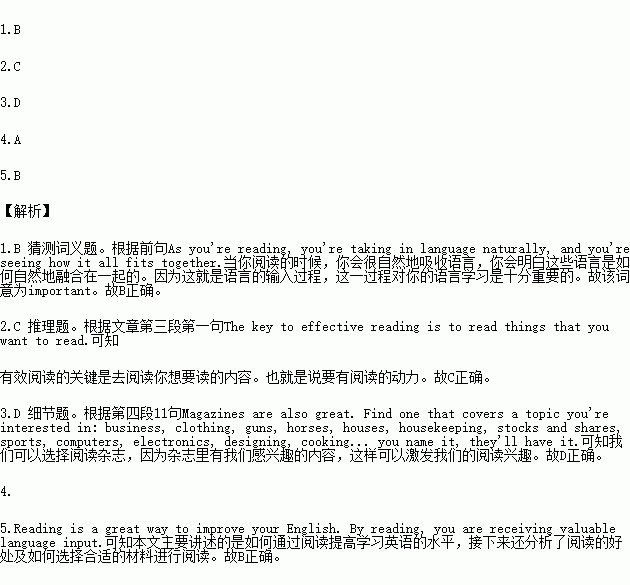题目内容
Reading is a great way to improve your English. By reading, you are receiving valuable language input. As you’re reading, you’re taking in language naturally, and you’re seeing how it all fits together. This is crucial to your learning.
The key to effective reading is to read things that you want to read. There are millions of books, magazines and websites out there. You couldn’t possibly read them at all. So the important thing is to find things that you like reading. Then, you’ll be motivated to read. And then the reading won’t be difficult. It’ll be easy! And then you’ll learn. It’s simple.
Remember: read what you want to read—what you like reading and what motivates and inspires you. But where can you start? Well, you could read a book that you’ve already read in your own language first, then in English. Ma gazines are also great. Find one that covers a topic you’re interested in: business, clothing, cooking…you name it, they’ll have it. Why not join a forum(论坛)?Go to google Groups,which has discussion groups based on common interests. Just type in the topic that interests you and join the chat.
gazines are also great. Find one that covers a topic you’re interested in: business, clothing, cooking…you name it, they’ll have it. Why not join a forum(论坛)?Go to google Groups,which has discussion groups based on common interests. Just type in the topic that interests you and join the chat.
Finally, how you read is also important. The best thing is to read without using a dictionary. Let the words flow over you. Just skip the parts you don’t understand. If you make your reading feel too much like work, it’ll stop being fun. Of course, you could make a note of any new words and phrases that you like or see repeated frequently, but try not to break your concentration too much. Also, set yourself mini-objectives. For example, if you’re reading a novel, read 20 pages a day. Very soon, you have been exposed to thousands of useful phrases and words. Have fun reading! You’ll learn so much!
1.The underlined word “crucial” in the first paragraph is closest in meaning to “________”.
A. easy B. important C. difficult D. suitable
2.The key to effective reading is________.
A. to read millions of books
B. not to learn grammar rules
C. to be motivated to read
D. to read easy things
3.You can start to read by________.
A. reading the news in English first
B. reading a book that you’ve already read in English
C. going to Google Groups to practice spoken English
D. reading magazines containing topics you are interested in
4. From the passage we can learn that________.
A. when reading you needn’t look up every new word in the dictionary
B. the great thing about reading is that you can read without any effort
C. you should make notes of every new word and phrase while reading
D. to read is as much fun as to work
5. The best title of the passage is “________”.
A. How To Read English Novels
B. How To Learn English By Reading
C. How To Absorb Expressions And Phrases
D. How To Learn English Without Any Effort
 阅读快车系列答案
阅读快车系列答案

 the earthquake.
the earthquake.